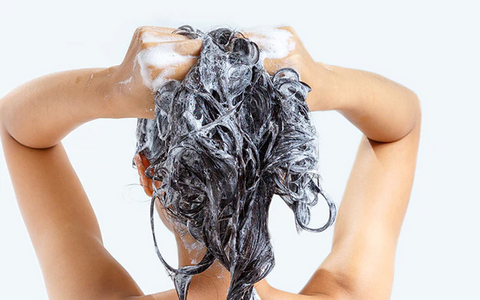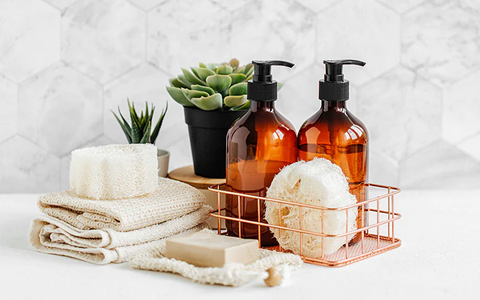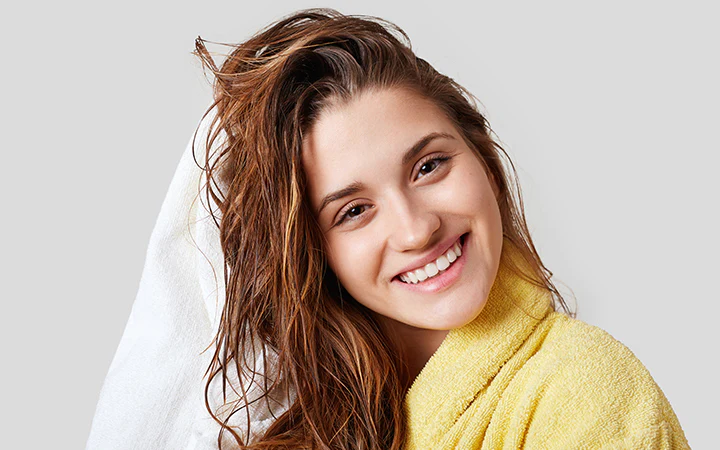Most likely, washing your hair is the first step in keeping up a good hair care regimen. But how do you pick a product that is worth your hair when there are so many different shampoos and hair cleansers on the market?
While shampoos and hair cleansers have similar functions, you should be aware of their differences before choosing the best product for your hair.
Let's examine these products' definitions and in-depth differences.
What Is A Hair Cleanser?
Shampoos and hair cleaners have the similar function, which is to clean your hair and get rid of product buildup and dirt. On the other hand, hair cleaners tend to be milder and leave your hair feeling softer.
Hair cleansers are mild on your hair because they don't include sulfates. It cleanses your hair while preserving its natural oils. You might try utilizing hair cleaners if you have frizzy or dry hair.
What Is A Shampoo?
Shampoo and other hair cleansers are products that we have all used for a very long time. Shampoos are essentially used to clean hair in place of soap bars. Typically, they come in the form of viscous liquids that are designed to clean your hair and scalp by clearing the hair follicles of leftover hair care product residue, excess sebum, and grime.
Shampoos typically contain sulfates, which have the tendency to deplete natural oils from your hair, and they function as cleaning or foaming agents. Since sebum and dirt are typically insoluble, washing your hair with just water is insufficient to get rid of them completely. This insoluble filth, sludge, and oil are easily removed with a shampoo high in sulfates. A shampoo usually consists of a blend of several surfactants that combine to create a thick lather, which effectively cleans your hair and scalp.
But not every shampoo has sulfate in it. There are also a lot of shampoos without sulfates. If you already suffer from a scalp ailment such as eczema or contact dermatitis, you might want to use a shampoo without sulfates.

Major Differences Between Hair Cleansers And Shampoos
Although both the products' end goal is the same, they vary significantly in their composition and how they clean your hair. Let’s take a closer look at the differences.
1. Who Should Use This?
Shampoos are harsher than cleansers. Your hair's natural oils are left in place. In such case, cleansers are ideal for dry, fragile, or damaged hair types. If your hair is bleached or curly, a cleanser is perfect. Additionally, utilize cleaners rather than shampoos if you use hair color and style products.
Shampoo is a cleaning product made of detergents and surfactants. When combined, these substances aid in cleaning your hair and follicles of oil, perspiration, debris, and product buildup. Therefore, a shampoo can provide your hair and scalp with a deep cleaning if you use various hair style products, work outside where you are exposed to pollutants, or perspire a lot.
2. Main Purpose
The main goal of using a hair cleanser is to wash your hair gently without removing any of its natural oils. If you must wash your hair every day, use a cleanser that leaves your hair feeling silky.
On the other hand, utilizing a shampoo can assist you in cleaning your hair and scalp of debris, pollutants from the environment, grime, product buildup, etc. The harsh chemicals used in the formulation of most shampoos might cause your hair to become dry. To get the greatest results, pick shampoos without chemicals.
3. Ingredients Used
A hair cleanser has a creamy look because to its mild "Michelle" formulation. Michelle is a water-and-oil blend, making her kinder to hair. As a result, the natural oils in your hair are not removed.
On the other hand, detergent, opacifiers, scents, sequestering agents, specific ingredients, preservatives, conditioners, and thickeners make up the basic formulation of any shampoo. They contain artificial detergents that fall into the following categories: natural surfactants, cationic, anionic, nonionic, and amphoteric.
4. How Frequently Can You Use?
Because hair cleaners are kinder, they can be used every day. However, if your hair is too oily, you might want to consider washing once a week for a deep cleansing, followed by a cleanser wash. By doing this, you can be sure that your hair will be thoroughly washed without losing its natural moisture and oils.
But how often you wash your hair relies on a variety of factors, including your lifestyle, surroundings, and hair type. For instance, you might need to wash your hair every day if you work out or perspire a lot. Or you must shampoo your hair every day if you reside in a humid area. Shampooing more frequently might also be beneficial for people with very fine hair or an overly greasy scalp. Shampooing your hair once a week is sufficient if you have thick hair, tight curls, or textured hair.
5. How To Apply?
Use lukewarm water to moisten your hair before using a hair cleaner. Apply a generous amount of the cleanser to the hair strands by squeezing it out. After gently massaging in a circular motion, rinse. Apply conditioner, focusing on the middle of the length till the end. To untangle the knots, use a wide-tooth comb or a detangler.
If you are using a shampoo, use warm water to wet your hair. Apply a small amount of shampoo to your hair. To create a lather, work in a circular motion. When massaging, pay particular attention to your scalp. Be kind. Excessive rubbing may cause the hair to fall out. Make sure to rinse thoroughly.
6. When To Apply?
Look out for these indicators before scheduling your hair wash. Choose cleansers if you have greasy hair or if dirt buildup is making your scalp itch. Cleansers are milder than shampoos, so you can use them more often.
Although there isn't a set guideline, you can think about shampooing your hair every two to three days. It's time to shampoo your hair if you see product buildup in your scalp, dandruff, or oily hair. Additionally, go for shampoo rather than cleanser if you want a thorough cleaning.
7. Side Effects
Cleansers don't include harsh chemicals and are hence milder. They therefore have no such negative effects and can be used safely. See your doctor right away if any side effects, such as scalp itching, persist.
Strong detergents are found in shampoos. Frizz, brittleness, and rough texture might result from overusing it or from using the incorrect product. Additionally, if the detergent gets in your eyes, it might irritate them and make them red.
8. What Can You Add?
To clean your hair and encourage its health, try using DIY cleansers. Because egg whites are high in protein, you can use them as hair masks to control hair loss, encourage hair growth, and eliminate extra oil from your hair. You can wash your hair with it in combination with apple cider vinegar and lemon juice. In addition, you can wash your hair with honey, cucumbers combined with lemon juice and water, and other combinations.
You can incorporate multiple natural elements into your shampoo to achieve a long and lush mane. Aloe vera juice, for instance, is effective in treating dandruff and itchy scalps. You can incorporate a teaspoon of sugar into your shampoo to hasten the development of your hair. Glycerine can be added to your hair to help keep it hydrated, nourish your scalp, and encourage hair development. In addition to these, you can check what happens if you add tea tree oil, lemon juice, or peppermint oil to your shampoo.
Hair Cleanser Or Shampoo - Which One To Use?
Depending on a variety of criteria, including your lifestyle, hair type, use of hair care products, and the environment, you should decide which cleaner to use—a shampoo or a hair conditioner. A hair cleanser might be sufficient if you have sensitive, curly hair, don't have a sweaty scalp, or reside in a chilly climate. On the other side, you might require more frequent shampooing if your scalp secretes too much oil or if you have an excessive amount of product buildup.

Final Thoughts
Shampoos and hair cleansers both contribute to the cleanliness of your hair and scalp. You should take into account the formulation variations before making a purchase, though. While shampoos contain sulfates, which tend to strip your hair of its natural oils, hair cleansers are typically kinder on your hair. Prior to selecting any hair product, be sure you know what your hair requires. If you are unable to comprehend, keep an eye out for warning indications and then determine whether to wash your hair with a shampoo or a hair cleanser. To preserve the health of your hair, combine this with a good hair care routine.

